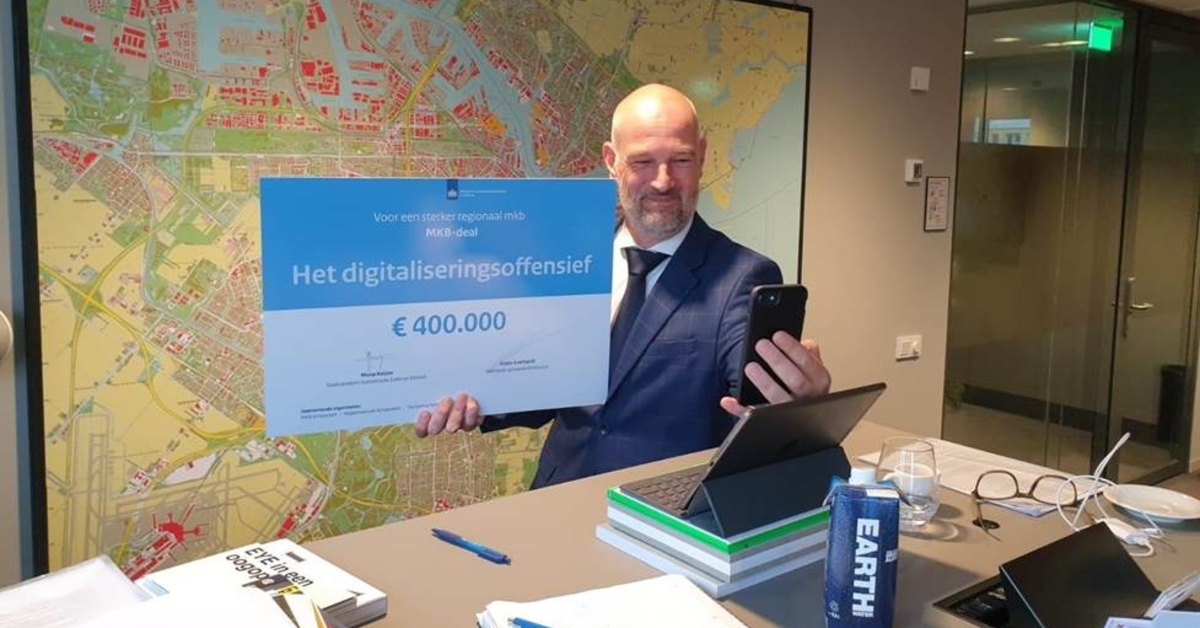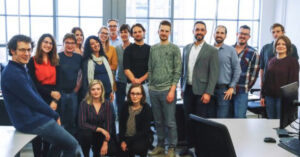Victor Everhardt, Alderman for Finance and Economic Affairs, signed off on the Digitalisation Offensive on 26 November, 2020 | Image credit: iamsterdam.com
Digitalisation is no longer an option but a necessity. Once considered a way for companies to gain a competitive edge, digitalisation has become a matter of survival post the COVID-19 pandemic.
While most businesses understand the significance of going digital, making transitional changes can be challenging. The key here is to have a solid strategy and guidance in place before digitalisation.
Get to know the amazing finalists here
SMEs are the backbone of any economy. According to Startup Amsterdam, across the Dutch capital, SMEs are responsible for roughly 60 per cent of employment, making them a vital part of the local economy. Therefore, it’s absolutely critical to have an infrastructure to help them digitalise.
Here’s why its imperative for SMEs to digitalise
In an exclusive conversation with Silicon Canals, Bart Drenth, head of MKB Amsterdam, explains why digitalisation of SMEs is essential. According to him, many small companies lack a clear vision regarding the ways in which digitalising their organisation can help them. Not only do they miss opportunities, it also makes them less competitive.
“We’re talking about sometimes even basic things like digitally maintaining records or staying in touch with customers,” he says. In other cases, there are more advanced opportunities like using artificial intelligence.
He says, “What we want to achieve is that entrepreneurs have a more clear view on how far along they are in digitalising and which possibilities are important for their specific case.”
Drenth shares, “For us as MKB Amsterdam, the most important thing is helping as many entrepreneurs take a step in digitalising. We consider what we’re doing now as building a pyramid; with a base of a large number of entrepreneurs where digitalising contributes small steps to their entire process with an increasingly more specific group that sees digitalising as fulfilling an important role. And for whom there are tools available, made for their specific use cases.”
He concludes by saying that not all companies benefit from working with startups, but “if the base of the pyramid is broad enough in the long term many companies will.”
Challenges for SMEs
In general, SMEs face numerous challenges in adopting and benefitting from new digital technologies. Further, the digital transformation of a business often involves a procedure of search and experimentation with new business models and technologies. In this process, some seize the benefits whereas others fail.
Explaining the challenges, Drenth says, “Challenges vary. Where some small entrepreneurs struggle with basic questions, others are already very far. In our way of working, this difference is key. Some are helped with a standard solution. Others need a custom solution. For that second group, contact with a specialised startup can be interesting, since they can help them with that. Naturally, this can also be beneficial for startups, as they can get in touch with potential launching customers.”
Digitalisation Offensive: Defending SMEs from digital dismay
To support and fast track the digitalisation of SMEs, the Amsterdam University of Applied Sciences, StartupAmsterdam, MKB-Amsterdam, and Ready to Scale have come up with a new initiative – Digitaliseringsoffensief (Digitalisation Offensive). The programme supports entrepreneurs from the Amsterdam region with digitalisation to help their SMEs grow faster, and is made possible by the Ministry of Economic Affairs and the Municipality of Amsterdam.
Victor Everhardt, Alderman for Finance and Economic Affairs, signed off on the Digitalisation Offensive on 26 November, 2020.
The Digitisation Offensive will kick-off on September 16 in the Johan Cruijff Arena. The program starts at 3:30 PM with presentations about digitisation opportunities, information markets, and workshops.
During the programme, participants can make use of the workshops aimed at making their companies more digital. They can also use it as an opportunity to network with their partners or other entrepreneurs.
Interested participants can register via this link, which will redirect them to the Digitalisation Offensive website. Once the participants complete the registration and login into the platform, they will have the opportunity to participate in a survey that helps them discover how digital their company is. By logging in, participants also gain access to a treasure trove of relevant information, along with access to different insightful webinars.
Startups helping SMEs
At present, numerous startups and scaleups in Amsterdam offer B2B digital solutions to SMEs, but have a hard time connecting with entrepreneurs.
Joël Dori, Startup Liaison at StartupAmsterdam, talks in depth about the importance of an initiative such as Digitaliseringsoffensief, and the role startups can play in digitalisation of SMEs.
“At StartupAmsterdam we believe that a collaborative entrepreneurial ecosystem moves Amsterdam forward. Regular SMEs are the backbone of the economy in the region, but lockdowns and changing competition have shown the need for digitalisation. At the same time startups and scaleups in Amsterdam offer great B2B digital solutions to these companies, but have a hard time connecting with this group of entrepreneurs. With this project we’re bringing these two groups together to facilitate collaborations,”
Dori adds, “Digital developments over the past decades have changed the way of doing business. We have seen innovative startups come up with useful digital tools for marketing, bookkeeping, HR, CRM systems, and sales moving these efforts largely online.”
However, regular SMEs often find it difficult to adapt to the accelerating rate of digitalisation. Many SMEs fear missing out on opportunities but don’t know how to make the cut.
“This became even more clear during the lockdown when most physical stores had to close, and webshops were the only way of selling products. By connecting startups that offer useful digital B2B tools to these SMEs, this offensive works two-sided. Regular SMEs are being helped with stepping into the new digital age and making use of digital tools, while startups have access to SMEs to offer their digital tools,” Dori adds.
He shares an example of the startup Peddler and how it’s helping SMEs. “Normally uploading an inventory of an SME to create a webshop is very time consuming. The startup Peddler helps SMEs by uploading their whole inventory online on Peddler’s platform within a day using their digital tool. Furthermore, Peddler offers customers same-day delivery of the products on e-bikes. This has enabled multiple SME’s to reach customers online and increase their revenue.”
He also shares some valuable insights and tips for startups seeking connection with SMEs. “There’re a lot of digital tools and services out there, so it can be overwhelming for a small SME to choose which one is the right one for them. Keep it simple and show the SME clearly what’s in it for them. For example, what will the costs and benefits of Search Engine Optimisation be in their specific area of business?”
How partnering up with Salesforce helped him succeed!










